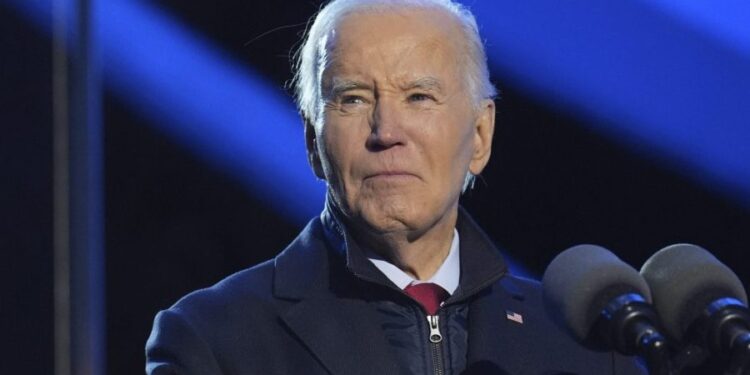
President Biden’s consideration of preemptive pardons for those he fears may be targeted under a coming Trump administration is dividing his allies and igniting pushback from the GOP.
Biden has had discussions with members of his senior team about using his pardon power to shield Trump critics, sparking formal deliberations in the White House counsel’s office.
The concern is that Trump could go after those like Sen.-elect Adam Schiff (D-Calif.), former Rep. Liz Cheney (R-Wyo.), and former White House chief medical adviser Anthony Fauci — all figures the prescient-elect has criticized with veiled threats.
It’s a remarkable step — one that has pockets of support among Democrats but that was largely rejected by Biden allies in Congress, even as most say they are concerned by Trump’s past comments.
Rep. Jerry Nadler (D-N.Y.), the top Democrat on the House Judiciary Committee, pointed to a list included in a book by Kash Patel, Trump’s pick to lead the FBI, in approving the idea of some kind of pardon for high-profile Trump critics.
In “Government Gangsters,” Patel identified 60 people he has said “must be held accountable and exposed in 2024.”
“I think that would be a good idea. In fact, I think he should take a look at the book his FBI nominee, Kash Patel wrote,” Nadler said. “He should probably pardon everyone on that list.”
Others were more circumspect.
“It’s obviously a response to an extraordinary set of threats against citizens who did nothing other than participate in government and do their jobs. So, you know, it raises a lot of complicated legal and moral questions,” said Rep. Jamie Raskin (D-Md.), a former constitutional law professor.
He didn’t rule out the idea but called it “legitimate to look at each one of those cases.”
“A pardon is like a case in court. It requires a monumentally detailed and specific analysis,” Raskin said.
But several Democrats cautioned Biden against doing so or flat out rejected the idea.
“This is not a discussion we should be having, and the fact that we are having this discussion is a reflection of the incompetence and dangerousness of some of Donald Trump’s nominees — not all of them, but some of them — and that is where we should be putting our focus, not on whether President Biden is going to take the extraordinary step of trying to preemptively protect people from political retribution through the weaponization of our criminal system,” said Rep. Dan Goldman (D-N.Y.), who as a staffer worked on Trump’s first impeachment.
Sen. Richard Blumenthal (D-Conn.) told CNN he would “strongly oppose” the idea of issuing pardons for Trump critics who haven’t committed any offenses.
“The way to stand up to a bully, like Donald Trump, is not to run and hide. It’s to confront him. And that’s what we ought to do if they misuse the Department of Justice,” the senator said.
“I believe the way to confront Donald Trump is to put together a defense team, and a defense fund. I’d be happy to join it. And what we should do is support those people, who are potentially in jeopardy.”
Others saw it as a stretch of a presidential power that should be reserved for those who did not achieve fair outcomes in the justice system, and who perhaps received outsize sentences for nonviolent offenses.
“We should be curtailing pardon power. Our party needs to be the party that’s reforming pardons to have some guardrails on it,” said Rep. Ro Khanna (D-Calif.) “And I don’t think Democratic presidents should be using these powers.
“To the extent they are going to be using it, they should be using it for people who are being convicted of marijuana possession and being in jail. I mean, come on, people who’ve served in Congress or Senate or the Justice Department, these are some of the most privileged people in the history of humanity,” Khanna said.
Any improper targeting must be fought “in the democratic way, on the media [and] with our institutions, but I’m not for the use of an archaic pardon power for curtailing that.”
Numerous Democrats said they were pushing for pardons for those already undergoing vetting. Since pardoning his son, Biden has been under pressure to pardon others, like death row inmates and nonviolent offenders.
“There’s a number of names that Department of Justice has sent up. They’ve been approved, they’ve gone through the application process, and they’re ready to go. I’m hoping he’ll sign those. Many of them are nonviolent offenders, marijuana offenses, stuff like that. I think this is the kind of way he should use his pardon power,” said Rep. Glenn Ivey (D-Md.), a former prosecutor.
Biden ignited scrutiny of his pardon power with his decision to give a full and unconditional pardon for his son Hunter Biden.
The president said he was issuing the pardon because Hunter Biden had been subject to a political prosecution. The White House later said the pardon was issued because the president believed Trump and the GOP would not let the issue of Hunter Biden go.
President Biden has issued just 26 pardons during his presidency, though many presidents wait until the final months to issue the bulk of their pardons.
Republicans also questioned any plans to use the power for political figures.
“That’s within his prerogative. But I think he’s possibly abusing the pardon process,” said Rep. Michael McCaul (R-Texas), also a former prosecutor.
“Typically, pardons are not done for political purposes. … I worry about an abuse of the pardon system by any president,” he said, noting suggestions from Trump that he plans to use his pardon power after taking power. That includes a pledge to pardon Jan. 6 defendants.
“There’s a lot of people you know are facing indictment for a lot of different political reasons that he may end up doing the same thing,” McCaul said.
Rep. Dan Bishop (R-N.C.), who was actively involved in the House Judiciary investigation into the Biden family, was firmer.
“It is the deep state circling the wagons in an attempt to avoid accountability,” he said of the proposed pardons.
“And he’ll do what he’ll do, and the American people can watch it just like they’ve seen what it signified for Hunter Biden to be pardoned,” Bishop said.
He said Hunter Biden had been “pardoned for a decade of crime” and that he wouldn’t be surprised if President Biden pardoned other “criminals.”
“Of course it’s inappropriate. Of course it’s an abuse of power,” Bishop added.
The idea of pardoning Trump’s critics has won traction from some who formerly worked in the first Trump administration.
“All we’re doing is speaking the truth,” Olivia Troye, a former aide to former Vice President Pence, said during an appearance on CNN this week. “But in today’s environment, in terms of what’s to come under the Trump administration, I think that’s something that we’re all thinking about and wondering what’s to come.”
Troye, who endorsed and campaigned for Vice President Harris, noted that Patel threatened legal action against her after she was critical of him.
A sitting president can issue a blanket pardon to Americans who haven’t committed crimes as a preemptive step, but it’s an incredibly rare move, one most notably used for former President Nixon.
No decisions have been made by President Biden, nor has a formal proposal been submitted to the president, a source familiar told The Hill.
Press secretary Karine Jean-Pierre said Biden is reviewing other pardons but added she wouldn’t get ahead of the president about confirming conversations on preemptive pardons.
“He’s going to make announcements on pardons and commutations, that is something every president, historically, presidents do especially at the end of their term,” she said.
Complicating matters is that some of the figures who would be covered by such a pardon have said they aren’t interested.
“I have more confidence in our system [to be] able to withstand potential abuses of power by the president. … I think the courts are strong enough to withstand the worst of his threats. And I don’t think a preemptive pardon makes sense,” Schiff said during an appearance on NPR last month.
“I think this is frankly so implausible as not to be worthy of much consideration. I would urge the president not to do that. I think it would seem defensive and unnecessary.”






